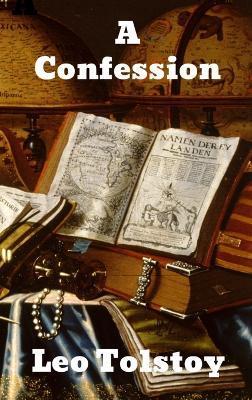A Confession

A Confession
A Confession or My Confession, is a short work on the subject of melancholia, philosophy and religion by the acclaimed Russian novelist Leo Tolstoy. It was written in 1879 to 1880, when Tolstoy was in his early fifties.
The book is a brief autobiographical story of the author's struggle with a mid-life existential crisis. It describes his search for the answer to the ultimate philosophical question: "If God does not exist, since death is inevitable, what is the meaning of life?." Without the answer to this, for him, life had become "impossible".
The story begins with the Eastern fable of the dragon in the well. A man is chased by a beast into a well, at the bottom of which is a dragon. The man clings to a branch that is being gnawed on by two mice (one black, one white, representing night and day and the relentless march of time). The man is able to lick two drops of honey (representing Tolstoy's love of his family and his writing), but because death is inevitable, he no longer finds the honey sweet.
Tolstoy goes on to describe four possible attitudes towards this dilemma. The first is ignorance. If one is oblivious to the fact that death is approaching, life becomes bearable. The problem with this for him personally is that he is not ignorant. Having become conscious of the reality of death, there is no going back.
The second possibility is what Tolstoy describes as epicureanism. Being fully aware that life is ephemeral, one can enjoy the time one has. Tolstoy's problem with this is essentially moral. He states that Epicureanism may work fine and well for the minority who can afford to live "the good life," but one would have to be morally empty to be able to ignore the fact that the vast majority of people do not have access to the wealth necessary to live this kind of life.
Tolstoy next states that the most intellectually honest response to the situation would be suicide. In the face of the inevitability of death and assuming that God does not exist, why wait? Why pretend that this vale of tears means anything when one can just cut to the chase? For himself, however, Tolstoy writes that he is "too cowardly" to follow through on this most "logically consistent" response.
PRP: 165.25 Lei
Acesta este Prețul Recomandat de Producător. Prețul de vânzare al produsului este afișat mai jos.
148.72Lei
148.72Lei
165.25 LeiIndisponibil
Descrierea produsului
A Confession or My Confession, is a short work on the subject of melancholia, philosophy and religion by the acclaimed Russian novelist Leo Tolstoy. It was written in 1879 to 1880, when Tolstoy was in his early fifties.
The book is a brief autobiographical story of the author's struggle with a mid-life existential crisis. It describes his search for the answer to the ultimate philosophical question: "If God does not exist, since death is inevitable, what is the meaning of life?." Without the answer to this, for him, life had become "impossible".
The story begins with the Eastern fable of the dragon in the well. A man is chased by a beast into a well, at the bottom of which is a dragon. The man clings to a branch that is being gnawed on by two mice (one black, one white, representing night and day and the relentless march of time). The man is able to lick two drops of honey (representing Tolstoy's love of his family and his writing), but because death is inevitable, he no longer finds the honey sweet.
Tolstoy goes on to describe four possible attitudes towards this dilemma. The first is ignorance. If one is oblivious to the fact that death is approaching, life becomes bearable. The problem with this for him personally is that he is not ignorant. Having become conscious of the reality of death, there is no going back.
The second possibility is what Tolstoy describes as epicureanism. Being fully aware that life is ephemeral, one can enjoy the time one has. Tolstoy's problem with this is essentially moral. He states that Epicureanism may work fine and well for the minority who can afford to live "the good life," but one would have to be morally empty to be able to ignore the fact that the vast majority of people do not have access to the wealth necessary to live this kind of life.
Tolstoy next states that the most intellectually honest response to the situation would be suicide. In the face of the inevitability of death and assuming that God does not exist, why wait? Why pretend that this vale of tears means anything when one can just cut to the chase? For himself, however, Tolstoy writes that he is "too cowardly" to follow through on this most "logically consistent" response.
Detaliile produsului










